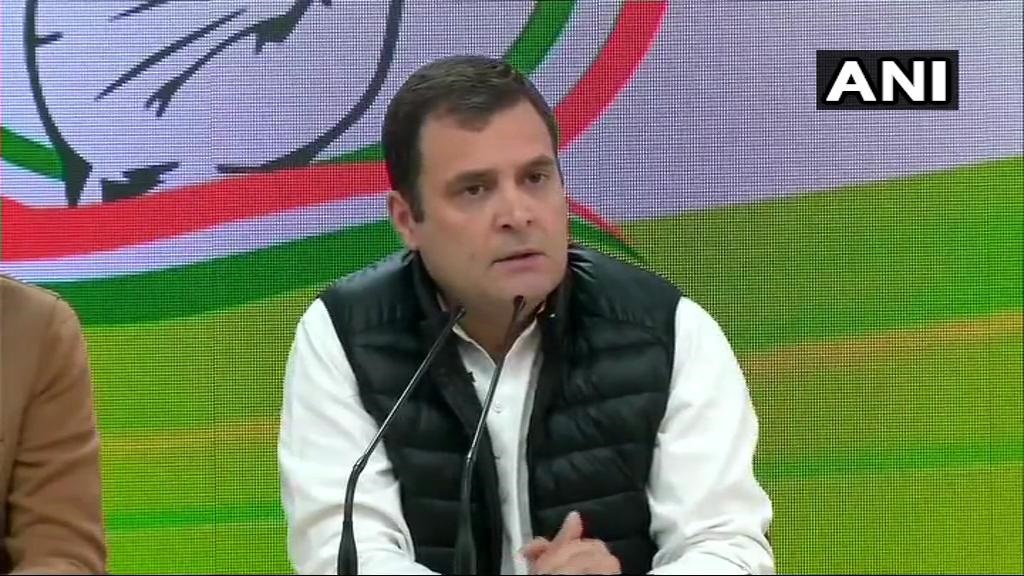
Rahul's jibe at Modi: 'It's still the jobs and farming, stupid!'

Rahul Gandhi must surely be a fan of US Democratic party strategist James Carville. Against the foreign policy and national security heft that then US President George Bush commanded following US victory in Gulf War I, Carville scratched out a victory for his candidate, Bill Clinton, by reminding everybody and himself, “It’s the economy, stupid.”
The Congress manifesto released on April 2 focused almost exclusively on jobs, putting money in the pockets of the poor, education and other social services besides promising to deliver on hot button issues specific to states such as NEET in Tamil Nadu and Citizenship Bill in the Northeast. If MNREGA was the flagship scheme that brought the Congress back to power in 2009, Rahul Gandhi has announced that Nyay, the minimum income guarantee scheme, will be the party’s flagship in 2019. Rahul Gandhi dismissively said national security was an area in which the Congress’s record spoke for itself.
Key promises were made that sought to derail Narendra Modi’s re-election bid. For instance, the manifesto promises decriminalisation of farm loan defaults. The Congress party will ensure that only civil suits are filed in case of loan default.
A promise was made to strengthen government health care and lay emphasis on it as opposed to proliferation of private hospitals whose nexus with private insurance companies have made healthcare a profit making machine for the corporates. This is a major announcement and would affect states such as Tamil Nadu that has developed into a major medicare hub receiving patients from within the country and abroad.
The Congress has promised to hike expenditure on education to 6% of GDP as opposed to 2 to 2.5% now. The Congress manifesto revives an old promise its government made at the World Social Summit (Copenhagen) in 1995.
The manifesto promises to extend MGNREGA from 100-days employment to 150 days. This is a major announcement that should be favourable to tenant farmers and farm labourers.
The manifesto promises to abolish the much misused sedition law. A relic of the British era, Nehru had promised to remove it, but in subsequent years the law only got further strengthened. This proposal would be welcomed by liberal minded citizens, NGOs, activists and so on. The track record of the Congress has not been good on this, but a renewed promised would likely be welcomed.
The Congress party feels the economy is moribund and needs a kickstart and this can happen by rural spending which will happen through these programmes. The flagship programme of the manifesto is Nyay scheme which has already been announced by Rahul promising guaranteed income of ₹72,000 per annum to all those below poverty line. This means a dole that would reach 25 crore people of 5 crore households.
The manifesto has also tried to woo the urban population by saying pollution is to be treated as national emergency. This is important as the entire north is reeling under pollution. It is estimated that 40% of diseases are either caused or intensified due to pollution.
Drawing a contrast to Modi
In his overall remarks at the event in New Delhi marking the release of the manifesto, Rahul Gandhi challenged once again PM Modi for a one-to-one debate on crucial issues. He was likely trying to show that there is no TINA factor this election. When a direct question was asked whether the reporter was talking to a prime ministerial candidate, he ducked it saying it was for the people to decide and he was only doing his work.
Rahul played safe on the issue of nationalism, saying the Congress record was there for all to see but did not elaborate. He was likely recalling his grandmother who resoundingly won a war against Pakistan and divided it into two nations. Holding forth on this would have invite reprisals from the BJP and likely deflect attention from the core issues of the manifesto. So Rahul did not digress.
On Modi’s jibe that he had fled to Wayanad after failing to face the heat of Hindus, he said everyone was a Hindu but refused to engage on the BJP narrative. But he did add that his move was to assuage southern anxiety over being neglected by the Centre led by Modi.

